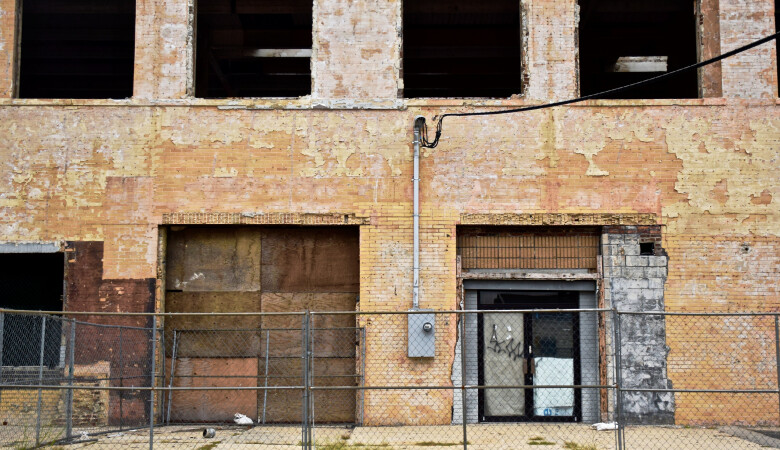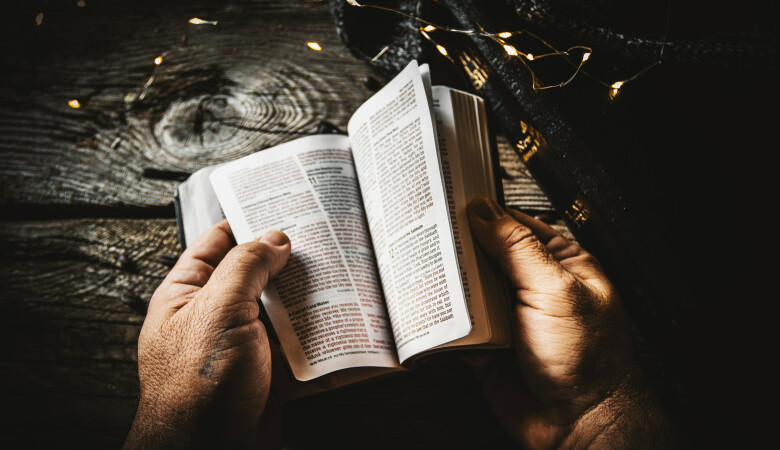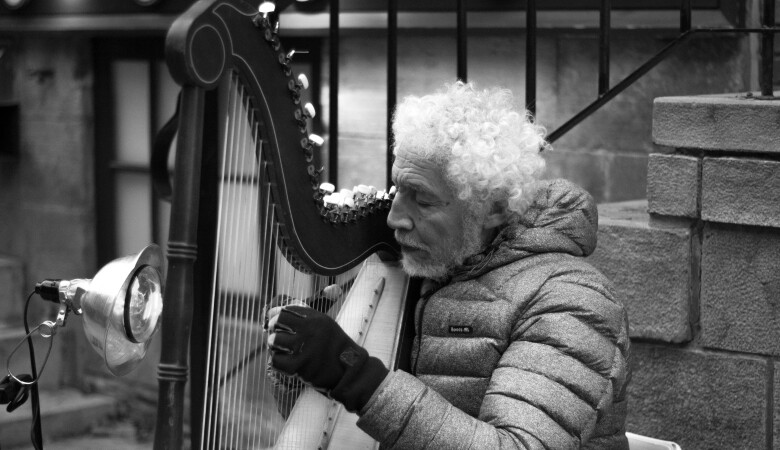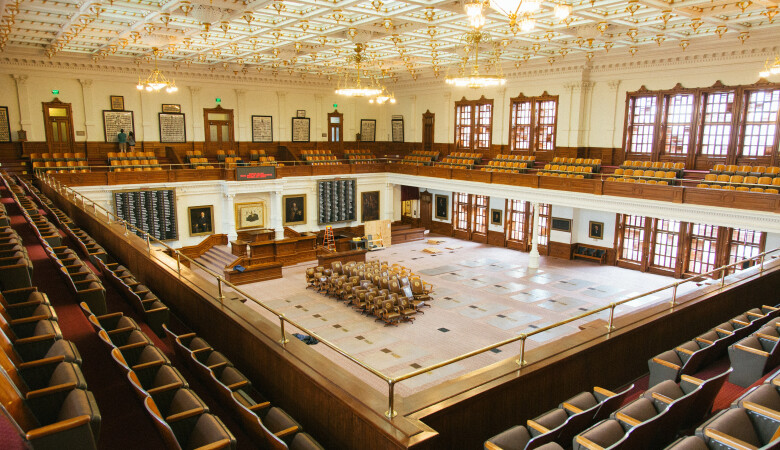Cleaned Up But Not Converted (Matthew Sermon 56 of 151)
June 01, 2003 | Andy Davis
Matthew 12:43-45
Sanctification, Sinful Nature
Introduction: A God-shaped Vacuum
This morning we are going to look at a fascinating passage, Matthew 12: 43-45. I want to focus in on your hearts this morning that I might try to understand what's going on in there. What do you love? What is your treasure? What are you yearning for? What are you living for? Back in the 17th century, one of my heroes, Blaise Pascal did a remarkable experiment. He made a tube of glass over three stories tall. He filled it with fluid and put it in a vat of the same fluid and did an experiment on barometric pressure. From those experiments, he understood the pressure in fluids, and eventually we got hydraulic breaks and pistons and hypodermic needles and such out of that thinking that he did. What was fascinating to the people at the time was when you filled this tube of glass full of fluid, and lifted it up, it would drop down to a certain level and they wondered what was in the top. It was a cupped-off ending of a certain shape. It was Pascal more than anyone that helped us really to understand the concept of a vacuum. Pascal was also a committed Christian, who loved the Lord and who had a passionate relationship with Christ. It was he who said, "The heart has its reasons that reason doesn't understand,” and that faith in Christ goes beyond reason. He was a reasonable man, but he went beyond it. The statement, “There is within each one of us, a God-shaped vacuum that only God can fill,” is attributed to him. A God-shaped vacuum. Kind of an odd way to put it, but the idea is that there's this space and emptiness inside us that is meant for God, and only God can fill it. Others have said nature abhors a vacuum. Nature, or should we say, God, is going to fill that vacuum with something. Question is, what? Is it going to be the lusts of the worldly life that we live in, demonically induced, forced upon us by an evil and wicked world system? Or is it going to be moral reformation and cleaning up your life and worldly accomplishments and achievements? Or is it going to be Christ? It seems to me the text gives us these options.
What I want to say to you today is that demonically-driven lusts and worldly achievements and ethical reformation cannot occupy that space to satisfy you. Only Christ can. Jesus Christ alone can fill that spot in that empty place in your hearts. Now what is the context of this passage? Jesus is in conflict with the Scribes and Pharisees struggling over his ministry. They've rejected Him, they hate him. They opposed the kingdom that He proclaims. They're fighting him, and they come to him with a demand for a sign. Jesus has done an incredible river of miracles, one miracle after another. Probably more casting out of demons, I think, than any other sign. There were many demons driven out with a word.
Jesus in Matthew 12, says, "He was binding the strong man in plundering his house." He was coming into Israel and tying up Satan so that He could plunder his house. The Scribes and Pharisees were exactly wrong in their assessment of Jesus' ministry. They ascribed the miracles of driving out demons to the prince of demons, not the Messiah. Jesus is dealing with the fact that Israel, His own people, the Jewish people, are rejecting Him. He came to that which was His own, and His own did not receive Him. He's dealing with that in this text, and what he's doing in these few verses is very complicated. He's reasoning from one individual out to the whole nation. And as it is for one person, one demon possessed person, so it will be for the whole generation, the Jews. He says, "When an evil spirit comes out of a man, it goes through arid places seeking rest and does not find it. Then it says, I will return to the house I left. When it arrives, it finds a house, unoccupied swept clean and put in order, then it goes and takes with its seven other spirits more wicked than it than itself. And they go in and live there. And the final condition of this man is worse than the first.” He's been talking about a man, an individual man, and then he says that is how it will be for this generation for the whole nation. The key word I believe in the whole text is the word “unoccupied.” The demon comes back and finds the house. The man is really unoccupied. There's nothing in there, it's a vacuum. The house is swept clean and put in order. The man's life is together, it's cleaned up, but there's nothing inside. The God-shaped vacuum is not filled with God, it's filled with nothing. So the demon says, "Ah opportunity, seven other demons, flood in and the final condition of that man is worse than the first. That's how it's going to be for the whole nation. What I'm saying today is the demons, with all their lusts, are driving you to those things cannot occupy to satisfy. Secondly, I'm saying that moral reformation, cleaning yourself up with worldly accomplishment and achievements cannot occupy to satisfy. Only Christ can occupy to satisfy.
Demons Cannot Occupy to Satisfy
Let's look first at how demons cannot occupy to satisfy. In this text, Christ teaches us about demons. No one knows more about demons than Jesus Christ. Christ actually knows demons better than they know themselves. He knows what they want, he knows their condition. These three brief verses give us a rare and astonishing insight into the spiritual world right from the lips of Jesus.
We can learn about the demonic world this way. You might say, "How can we who are 21st century people believe in demons? We're also 21st century believers in the Bible, aren't we? Jesus clearly taught about demon, so as a Christian, you're brought to a pass, you can either believe Christ's teachings that there are demons who behave this way, or you can say I reject this but then once you reject that, what do you have left? The Bible teaches that there are demons, and Jesus here teaches us about them. I want to look briefly and quickly at thirteen brief insights about demons and demonic nature. First, Jesus calls them spirits, they are spirits. They're non-physical; they're not made up of atoms and molecules, and for this reason, they are free from fatigue. They are immortal; they're not constrained by space, thus many demons could inhabit one person. They are spirits.
Secondly, they are called unclean in the NIV. It says, evil spirits, but really the simplest translation would be “unclean.” It implies something of their nature, of their character. They're corrupt, they're wicked, they're vile, they love what is evil, and they hate what is good. It also implies something of a history of their actions. They've been involved in dirty deeds for generations. They are despicable, they are evil, and they pollute and make vile everything that they touch. The opposite is clean or pure. For example, Jesus said, "Blessed are the pure in heart for they will see God.” He also said to His disciples, "A person who's had a bath needs only to wash his feet, his whole body is clean, and you are clean because of the word I have spoken to you. But not every one of you,” meaning that Judas wasn't clean. What he's saying is through faith in His Word we can be clean. We can be clean but these demons, these spirits, are unclean. They are the very picture of filth from God's holy perspective. God's eyes are so pure, he cannot look at evil. The devil and his unclean spirits are the most vile things in the universe.
Thirdly, they are able to indwell a man in some way. We don't really understand this, but it's true. Verse 43 says, "When an evil spirit comes out of a man.” Now I don't fully understand what this means, but in some way, the devil, the demon can be in a man. For Jesus says "when an evil spirit comes out of a man," so the demon was in some sense in the man spiritually living with him controlling his thoughts, his actions in some sense, possessing him as if he were his own. They own the way we think and the way we reason, driving us to relentless sin because they are relentlessly empty themselves, but able to indwell a man. Fourth, they are powerless to stay if Christ says to leave. What makes the demon leave? "When an evil spirit comes out of a man." Jesus is referring to his own miracles of driving out demons. When Jesus says, “Go”, they must go. This is the terrifying power of God the Son. Jesus's word is powerful and demons must obey.
Fifthly, they are restless. Verse 43, "When an evil spirit comes out of a man, it goes through arid places seeking rest and does not find it." They're roaming, they're wandering, desiring rest. This is more than just looking for a new place to live. It characterizes their mental state. They are restless, wandering. They’re unfulfilled, they're not finding what they seek very much like the devil himself. In Job 1:7, the Lord said to Satan, "Where have you come from?" His answer, "from roaming through the earth and going back and forth in it.” The devil is yearning for something, roaming, looking for something, restlessly; rest is the very thing he will never find.
Sixth, they are not omnipresent. In other words, they are here or they are there, they're not everywhere. God is omnipresent; He's everywhere at once, but demons are not. They move from one place to another. They may move fast, they have no fatigue, and no earthly boundaries or borders. They do have spiritual restrictions though. In Job 1:10, Satan complains about those spiritual restrictions. He wants to get at Job and Satan says, "Have you not put a hedge around him that I can't get at him.” They do have boundaries, but they can move. They're confined one place at a time. Seventh, they are intelligent, they have a plan. They think about what they want to do. In Verse 44, the demon says, "I will return to the house I left.” They make up a plan, they have an idea of what they want to do, they think it through. Demons are thinking beings, they decide what to do. The devil is spoken of as having schemes. The devil has a plan. Have you not felt this in your own life, have you not been laid low, by a temptation and realized that it was a whole combination of things that led to the point where you were willing to yield to something that morning you said you'd never yield to again, what happened to you? Well, the devil had a scheme, he had a plan, a strategy, and it worked. They're intelligent, they make plans.
Eighthly, they are self-determined. “I will return to the house I left.” They're self-determined, they're not under Christ's kingship. They don't submit to His authority at all, they do what they feel best. The devil himself in Isaiah 14:13-14, speaking through a king of Babylon said, "I will ascend to heaven, I will raise my throne above the stars of God. I will sit enthroned on the Mount of Assembly on the utmost heights of the sacred mountain. I will ascend above the tops of the clouds. I will make myself like the most high. I will, I will, I will.” However in James 4:13-15 15 it says, “You who say today or tomorrow I will go to this or that city, spend a year there carry on business and make money. Well, you don't even know if you'll be alive tomorrow, what is your life? It is a mist that appears for a little while and then vanishes. Instead you ought to say, “If the Lord wills, we will live and do this or that.” That's the very thing a demon will never do. He's not going to say, “If the Lord wills, I'll return to the house I left.” No, he's going to go if he wants; he is self-willed.
Ninth, he is possessive. The NIV leaves this out. Sometimes it just does. It leaves out a possessive here in Matthew 12:44. By the way, I love the NIV. I accept the flaws because it really speaks so powerfully and clearly at other times. But in this case I have to let you know, there's a word left out of Matthew 12:44. The demon says, "I will return to MY house from which I came." It's possessive. It has a sense of ownership. The devil is very possessive. Remember when he took Jesus to the high mountain and showed Him all the kingdoms of the world and their splendor and he said, "All this has been given to me. And I can give it to anyone I want to." He has a sense of what's his now. This is what makes Christ's expulsion of demons such a great act of power. In Luke 11:21-22 it says, "When a strong man, fully armed, guards his own house, his possessions are safe but when someone stronger attacks and overpowers him he takes away the armor in which the man trusted and divides up the spoils." The demon feels a sense of ownership over his property. He feels like he owns it and he says, “I’ll return to my house from which I came.”
Tenth, demons are relentless, they are persistent, they come back later. "I will return," he says. The Devil and his angels, don't give up easily. Have you ever defeated the devil in a temptation and had the feeling that you would never have to deal with that issue again, and then later that day, or again tomorrow, he just keeps coming back and coming back with the same temptation. Even Jesus had to face this. Remember when he defeated the devil out in the desert. It says in Luke Chapter 4:13, ‘When the Devil had finished all his tempting, he left him until an opportune time. “I’m coming back.” What the devil's opportune time is, and what you think yours is are two different things. He's looking for weakness, an opportune time but he returns. His demons are relentless. They don't give up easily.
Eleventh, the demon is undaunted. He's not intimidated by moral reformation. He's not intimidated by a clean house. When he arrives, he finds the house unoccupied swept clean and put in order... And like I said, he says, "Time to get to work. Everything's looking good, it's all arranged, it's all neat and well-ordered.” He's not intimidated at all by moral reformation that you clean up yourself. No, it's time to mess it up. The demon thrives in bringing chaos where once there was good order. The real issue is that this house is unoccupied. There's no power, no force. There's no Christ in that vacuum, so he's going to flood in and fill it.
Twelfth, demons are cooperative with other demons. Verse 45, "Then it goes and takes with it seven other spirits more wicked than itself, and they go in and live there." They cooperate with other demons to make a monstrously huge impact on the world. They work together, and this demonic cooperation is the essence of Satan's kingdom. It's so essential that Jesus said, "If Satan drives out Satan, he is divided against himself, how then can his kingdom stand?" If demons start fighting one another, there's no kingdom anymore, so they work together. Multiple demons inhabiting one person has already been seen with the demonic hoard called Legion, and they're all in there. Jesus asked him, "What is your name?" "My name is Legion," he replied, "for we are many."
Thirteenth, the demons vary in wickedness, they're not all the same. Jesus says, "He goes and takes with it seven other spirits more wicked than itself." Doesn't that imply there's some kind of a gradation or order of wickedness? They're all in rebellion, but they're not all equally wicked. Some demons are just simply more vile than others. In any case, this moral cleaning up without being converted to Christ results in far greater evil in the end. The final condition is worse than the first. Jesus says, "That is how it will be with this wicked generation."
Alright, thirteen things about demons. Why can demons not occupy to satisfy? Demons do occupy people, they also drive and tempt, and entice, and lure, and seduce, and persuade people to join them in uncleanness all the time. They entice people to commit sin so that they will be just like them. Demons want us to be like they are, and enticing us to follow their ways and make us restless, yearning, hungry human beings, always eating but never satisfied. They make us demonic roamers of the earth. Remember Cain's punishment? After Cain killed his brother, Abel, God punished him and in Genesis 4:12 and following God said to Cain, "When you work the ground, it will no longer yield its crops for you, you will be a restless wanderer on the earth." A restless wanderer on the earth. Who does that sound like? It sounds like the devil. Cain said to the Lord, "My punishment is more than I can bear. Today, you are driving me from the land and I will be hidden from your presence. I will be a restless wanderer on the earth and whoever finds me will kill me." Do you see how much Cain is like the devil at this point? 1 John 5 said it was the devil that drove him because the devil's a murderer. Cain had become demonic in this way.
And so also Israel. When they refused to enter the promised land, God turned them aside and said, "Therefore, for the next forty years, you will roam restlessly through the desert until the next generation comes and they'll enter the land." David spoke of evil men in his day in exactly these same terms: restless, animal-like searching. Psalm 59:14-15, "They return at evening snarling like dogs and prowl about the city, they wander about for food and they howl if they're not satisfied." That's so demon-like. People in evil are hungry and searching for something. The devil is prodding them on, and they are never satisfied.
The theme is clear: A consistent pattern of restlessness, of roaming, of searching but not finding, of hungering and consuming but never being satisfied, of having no rest, no home. It is demonic to the core. For demons, like people, it's the same thing. There is only one place of rest. "Come to me all you who are weary and burdened and I will give you rest. Take my yoke upon you and learn from me for I am gentle and humble in heart, and you will find rest for your souls for my yoke is easy and my burden is light." Demons cannot occupy to satisfy because they have a yearning, yawning emptiness inside themselves that they're trying to fill, and the world order that they have arranged around us seeks to fill by the same way and it never will. Demons drive people to fill that emptiness with lust, the promise of satisfaction through physical sensual pleasure or with ambition, the promise of satisfaction through earthly power or with entertainment, the promise of satisfaction through mental stimulation apart from achievement. That's my definition of entertainment: the promise of satisfaction through mental stimulation apart from achievement and materialism, the promise of satisfaction through accumulation. These are the things the devils sell, and they do not satisfy, they do not occupy to satisfy. "When an evil spirit comes out of a man, it goes through arid places seeking rest and does not find it."
Morality & Worldly Accomplishment Cannot Occupy to Satisfy
A second theme is that morality and worldly accomplishment cannot occupy to satisfy. When the demon arrives, it finds a house, unoccupied, swept clean, and put in order. The house has been freed of demonic influence, but it's also free of the Lord, it's unoccupied. The Holy Spirit has not entered in, Christ is not Lord there. There's nothing there, it's a yawning spiritual vacuum and it will be filled by something. The word in the Greek[scholazo] “unoccupied” means literally to have leisure for or be available for, to be free for. It's like a "For Rent" sign or like at a hotel, they've got rooms for rent, it's unoccupied. From this word we get the word “scholastic” or “school.” It means to be free from labor in order to study higher things: science, math, philosophy, other things. That's why we call it liberal arts. It means you're free; free from earthly concerns so that you can pursue higher things. But this is my point, the freedom has to be for something, it's not going to remain empty. Christ frees up this man from a demon, and he’s freed up, he’s unoccupied; there's nothing there. No occupant has come to take its place. what does this man do? He uses it for moral reformation. He sweeps clean his house. The spirit was unclean, but this house is swept clean. The effects of the demon's past occupation are over.
Demons bring chaos, they bring disorder and mess, but now that this man is in his right mind, he starts to clean it up his life. But since the house is unoccupied by the Lord, it's nothing more than moral reformation, it's not conversion, not at all. The alcoholic goes to AA and stops drinking, the drug addict stops using the drugs, the user of internet pornography stops doing that, the adulterer breaks off the relationship and stops his bad habits. The spouse abuser, embarrassed by the potential public shame and maybe even conviction by the law, reforms his ways. The driven businessman, about to lose his family and he sees it coming, cuts back on his work life and his travel schedule so that he can spend more time with his wife and children. Cigarette smoker with early signs of emphysema quits cold turkey. The embezzler, terrified of his friend's conviction looks to his own business and cleans it up and starts doing things right because he doesn't want to get arrested. The glutton, afraid of the early warning signs of a heart attack starts to eat better and exercise. The guilty sinner, afraid of the consequences of his life, prays the prayer they tell him to pray, signs the card they tell him to sign, goes to the meetings they tell them to go to, but he's not converted. His life is improved but he's not converted. There's nothing inside. Perhaps he's just simply a Benjamin Franklin-style moralist; early to bed, early to rise makes a man healthy, wealthy, and wise. He starts to lead a clean life, a life of discipline and self-control, a life of self-actualization, good eating, good exercise, good business habits, making the most of every minute to achieve his goals which he has set for himself. All of these improvements are in themselves good things, but they're nothing if they're not the fruit of conversion. If it's not because Christ has entered your life, and now for his glory, you want to clean these things up and start living that way. Apart from that, is nothing but a mirage. It's like apples on a dead tree.
Churches in America are filled with these kind of folks. It's a dangerous substitute for the genuine thing. The favorite form of moral reformation is religion, a long list of religious dos and don'ts. If you keep them, you can boast to yourselves of your religious life and your moral purity. Pharisees' houses were swept clean, they didn't break any outward commandments, they offered long showy prayers, they announced their alms giving with trumpets, they fasted twice a week and made a big show of it, but they were unoccupied by the Lord, the indwelling Spirit was not there. They looked good on the outside, but were filthy on the inside. Matthew 15:8, "These people honor me with their lips, but their hearts are far from me."
Or there could be worldly accomplishment, good order, cosmetic arrangements, adornments. Once you get your house cleaned up, now you can start dressing it up, make it look good, put some good things in your house, some achievement, some awards, some things you can boast about, some accomplishments, checking boxes along the way, things that you can do. The house, the life, the career, the material possessions, the honors, the accolades and all of it in good working order, but it's empty because the house's unoccupied. There's no Christ. Moral reformation even through religion cannot occupy to satisfy. Worldly organization and adornment through achievement cannot occupy to satisfy. Jesus says, "The last house occupation shall be worse than the first." In the KJV, Matthew 12:45, "The last state of that man is worse than the first, even so shall it be unto this wicked generation."
Did you know that moral reformation and religiosity, as a response to the gospel, without genuine conversion, is worse than if you'd never heard the gospel at all? It's worse! It would be better never to have heard the gospel than to respond that way. 2 Peter 2:20-22 says, "If they have escaped the corruption of the world by knowing our Lord and Saviour Jesus Christ... " If they've cleaned themselves up, escape the corruption of the world, and are again entangled in it and overcome, they are worse off at the end than they were at the beginning. It would have been better for them not to know the way of righteousness than to have known it and then to turn their backs on the sacred command that was passed on to them. The proverb is true. A dog returns to its vomit and a sow that is washed goes back to her wallowing in the mud. You know why? Because it's still a dog, it hadn't been converted. It's still a sow. You can clean a sow but it's still a sow. It's cleaned up but it's not converted, and it's worse in the end. If you hear the gospel and don't believe, it'd be better for you never to have heard the gospel. What does it say about the future of Israel? Jesus, in effect, said they were demonic, strangleholds all over Israel, and he had driven out demons. The picture I get is, do you ever play at the beach and you're scooping out sand and the water keeps coming in? And if you can work fast enough, you can keep it dry for a little while. The demons, I think, had left and all at the boarders were waiting for Jesus to go back to heaven. The house, Israel in this case, the whole generation was unoccupied, swept clean, it was put in order. The demons were out in other countries waiting and then when Jesus goes, they come in like a flood.
Jesus wept over Jerusalem. He wept over it and he said, "Jerusalem, Jerusalem, you had killed the prophets and stoned those sent to you. How often I've longed to gather your children together as a hen gathers her chicks under her wings but you were not willing. Behold, your house is left to you desolate." What would be another word for desolate? Would it not be unoccupied? "For I tell you, you will not see me again." He connects their desolation to himself and he says, "I'm leaving, I'm going. I'm going back to heaven and the demons are going to come in and it's going to be worse in the end than before I came." A tangible, physical evidence of that was the destruction of Jerusalem by the Romans in 70 AD.
Christ Alone Can Occupy to Satisfy
Christ alone can occupy to satisfy. To say that Jesus Christ can occupy your heart to satisfy you, He can be your treasure and your pleasure. He can fill that God-shaped vacuum, he alone can do it, and he wants to do it. Do you remember what he said to the woman at the well, "Everyone who drinks of this water will thirst again. But whoever drinks of the water that I give him will never thirst for the water that I give him will become within him, a spring of water welling up to eternal life." That's the language of satisfaction, isn't it? “Drink as often as you like, drink again and again for I can occupy you from within you to satisfy you. I can take away your guilty conscience, I can pay for all of your sin, I can give you an indwelling Spirit, I can give you a purpose in life, I can do all of these things for you, I can fill your God-shaped vacuum to overflowing.” Christ, and Christ alone, can occupy to satisfy.
Application
What applications can we make of this? First, moral reformation without Christ leads to hell. Actually, it's one of the favorite ways of getting to hell: Cleaning up but not loving Christ. Secondly, the human heart was meant to be occupied free from bondage to be devoted to God. Understand this, know that your heart has this vacuum inside and it's going to be filled with something. Thirdly, recognize the limits of freedom and choice politically, even religiously. These days with the abortion rights, they speak of freedom to choose as though choice or freedom by itself is a good thing, and it isn't. It's totally connected to what is chosen. We are unoccupied, and then filled, but filled with what? Filled with demons or filled with Christ? And so freedom to choose and all of that thing, it's good is totally connected to what they choose.
Did you see what happened in Baghdad? Once the people were set free from Saddam Hussein's reign? They went wild, there was looting, there was pillaging, there were vigilante groups, there was murder until finally, law came in and brought restrictions again. Is that what we mean by freedom? Is that America's gift to the world as freedom? It wasn't America's fault, I'm not saying that at all, I'm just saying freedom by itself is nothing. It's totally connected to what we do with the freedom. Do we use freedom for sin or do we use it for God?
Fourth, does Christ dwell in your heart by faith? Does he? Is he there? Do you see how important a question this is? Ephesians 3:16, Paul says, "I pray that out of his glorious riches, he may strengthen you with power through his Spirit in your inner being so that Christ may dwell in your hearts through faith." When I was a student I saw a pamphlet called, “My Heart, Christ's Home.” Is he living inside you? Is he eating dinner with you? Are you fellowshipping with him from within? Does Christ dwell in your heart through faith? Ephesians 5:18, "Do not get drunk with wine which leads to debauchery. Instead, be filled, occupied with the Spirit."
And then fifth, have you ever heard the expression, "idle hands are a devil's workshop"? Have you found it to be true that if you're not occupied with something, you're going to be occupied with something else? And that something else is sin. We are meant to be occupied, devoted to the Lord's work. We are most vulnerable to sin when we are idle, unoccupied with Christ kingdom. Idle hands are the devil's workshop. So are idle minds and idle hearts. Fill your mind with pure truth. Saturate your mind with the Scripture, with the word of God. Colossians 3:16, "Let the word of Christ dwell in you richly." Let the word dwell in that empty space inside. Think about whatever is true, whatever is noble, whatever is right, whatever is pure, lovely, admirable. Fill your mind with these things. Fill your mouth with pure blessings from God. Speak to one another with psalms, hymns, and spiritual songs. Sing and make music in your hearts to God.
Ephesians 4:29, "Do not let any unwholesome talk come out of your mouth, but only what is helpful for building others up." Fill your mind with Scripture and your heart with Scripture. Fill your mouth with words of blessing, with the gospel message for this generation. And fill your days with useful service to Christ. Be very careful as it says in Ephesians 5:15 how you live, “Not as unwise but as wise, redeeming the time because the days are evil.” In the King James Version, in Luke 19:13, in the parable of the ten pounds, he called his ten servants and delivered them ten pounds each, and said unto them, "Occupy, until I come." You know what that means? Get busy, work at the kingdom.
One of my big fears for this church is it will just be satisfied and not occupied till He comes. That we would just take in the word and just take in the fellowship and the good things that are here and we will not, like warriors for Christ, occupy until he comes. We'll just get complacent and satisfied. You've got to get busy in the kingdom. I have to be busy in the kingdom or else that place is going to get filled up with something, and it isn't going to be good. Jesus Christ came into the world to fill that empty place inside of us. Demons and their lusts and all that can't fill it to satisfy neither can worldly accomplishments or moral reformation. Only Christ can. Do you know him?






























